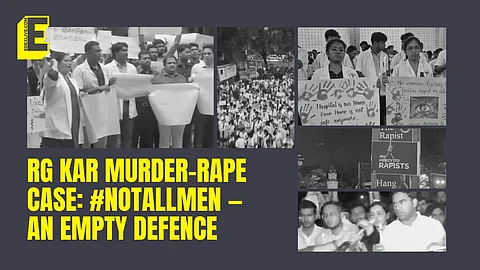

As nationwide protests rage on in the aftermath of the horrifying rape and murder of a woman doctor at the RG Kar Medical College and Hospital in Kolkata, a disturbing trend has come to light: Indian men commenting on social media posts where women share their experiences with sexual harassment and express their fears, responding with the hashtag #notallmen.
The first reaction to this should be one of shock.
The RG Kar incident is unimaginably ghastly. We are still far from uncovering the whole truth, there have being attempts to tamper with evidence in the name of renovating the seminar room where the crime occurred and the actions of miscreants trying to sabotage the college during the August 15 protests.
Following this incident, there is much to consider: how to increase safety for women in workplaces, remove barriers to reporting within organisations, and hold the government and judiciary accountable to ensure the swift delivery of justice.
In this context, debating whether all men are predators or addressing the hurt feelings of men who feel personally attacked by women’s concerns seems not only inappropriate but deeply misguided.
It’s like telling someone who has lost a limb in an accident that your pinky toe hurts. Your pain may be valid, but this is neither the time nor the place to express it.
But as men have been saying #notallmen since time immemorial to women who share their stories of sexual harassment and stories of feeling unsafe, here are a few other reasons why this argument is pointless apart from social inappropriateness.
Firstly, the #notallmen argument doesn’t add anything meaningful to the discourse. Yes, you’ve said #notallmen, and I agree (all women do). We know that not every man is a rapist; however, any man could be, which means we have to keep ourselves safe from every man anyway. The #notallmen claim is irrelevant precisely because of that reality — any man could potentially hurt us, and we have no way of knowing which one will and which one won’t.
But what is the point of saying #notallmen? Is the conversation supposed to continue? Did you intend to make an insightful point with this statement? If so, what was it? More often than not, there is no follow-up. #notallmen… so every woman is safe in the world? #notallmen… so go for a run alone tonight? #notallmen… so throw out your pepper spray, you don’t need it?
The #notallmen argument never leads to a claim that the world is safe for women — because we all know it isn’t. So, why make that argument when it serves no purpose and qualifies nothing?
This is because men use this argument to deflect and shut down the conversation when they get uncomfortable. However, discourse must continue regardless of who is awkward, precisely because secrecy around topics like sex and consent directly contributes to the rape culture we are currently living in.
Secondly, men sometimes use #notallmen as a form of virtue signalling. When they say #notallmen, they really mean, “I am not like that”. It’s an attempt to distance themselves from the problem, to say, “Don’t lump me in with the rapists”. But this, too, is pointless.
We do not live in a world where a sex offender would openly admit, “I am a sex offender”. We live in a world where they, too, would say #notallmen. So why should anybody believe you when you make that claim?
And lastly, the men who say #notallmen don’t believe it themselves. They don’t say #notallmen to their family members. Men counsel their sisters, wives, daughters, and mothers to always be cautious around men. They become immediately suspicious of any man interacting with the women in their families. They don’t leave their daughters unsupervised in the presence of strange men as they might with women.
Consider this: We frequently hire female babysitters and leave our children with them unsupervised without a second thought. But would you — or any man who advocates #notallmen — hire a male babysitter and leave your child unsupervised with him? The answer, more often than not, is no.
This hesitation reveals the deep-rooted distrust that even the most vocal proponents of #notallmen hold, whether they acknowledge it or not.
It’s easy to preach to strangers on the internet that we must let down our guards and believe all men because it wouldn’t affect the man preaching if something happened to that stranger. How they advise the people who matter to them — like wives and daughters — to act around men is the real test of whether the man is a true believer in #notallmen.
So, just as people ask women countless questions when they share their lived experiences of sexual harassment — about what they were wearing, whether they might have encouraged the behaviour, and what proof they have to ensure the incident actually happened — I have a simple tool I use to assess whether a #notallmen advocate truly believes in his ideology: I ask him to preach it to me after he hires a male babysitter for his child.
(Dr Christianez Ratna Kiruba is a 29-year-old internal medicine doctor, freelance health journalist and Deputy Editor at Nivarana, India's first public health digital platform. She is an intersectional feminist and part of the LGBTQIA community. She is interested in viewing public health issues through the gender lens. Views expressed in this column are her own.)
